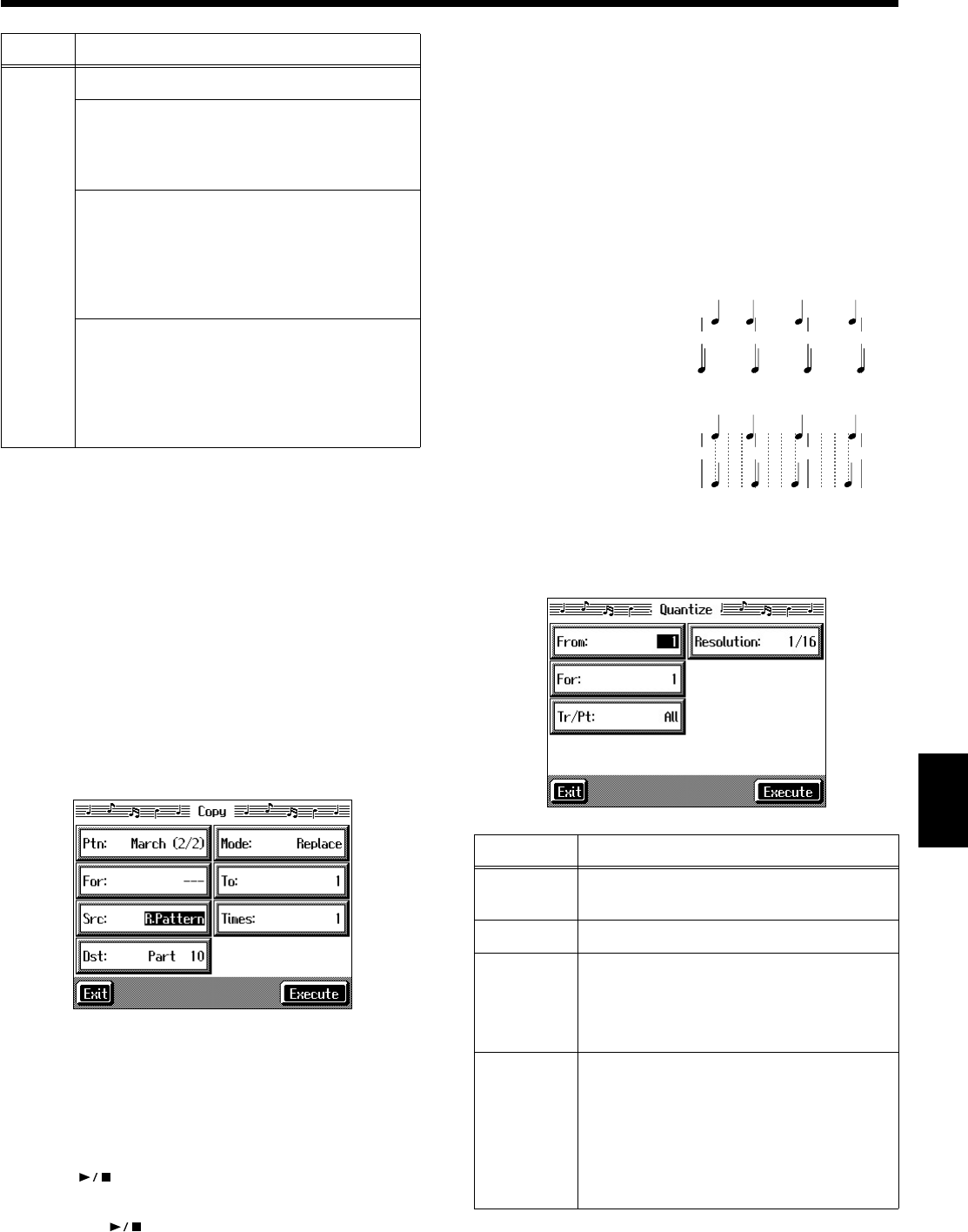
137
Chapter 7 Creating and Editing Songs
Chapter 7
■
Copying Rhythm Patterns to
Create Rhythm Parts
The KR features numerous internal rhythm patterns. You can
copy these rhythm patterns to create a rhythm part.
→
For more information about the name of Rhythm Patterns,
please refer to “Rhythm Pattern List” (p. 199).
At Step 3 of “Selecting the editing function” (p. 135), select
<Copy>.
For more about ordinary copying, please refer to “Copying
Measures (Copy)” (p. 136).
Select “Rhythm Pattern” as the <Src>.
This makes the setting for copying a built-in Rhythm Pattern.
fig.d-e-copy2.eps_50
• The rhythm pattern’s name and beat are indicated in the
<From> column.
• The <Dst> is fixed at “Part 10.”
• When the <Src> is switched to something other than
“Rhythm Pattern,” the KR is set to carry out normal
copying.
Press the [ (Play/Stop)] button to play back and
confirm the rhythm pattern. The rhythm pattern stops when
you press the [ (Play/Stop)] button once more.
■
Correcting Timing
Discrepancies (Quantize)
You can correct for timing discrepancies in a recorded
performance by automatically aligning the music with the
timing you specify. This is called “Quantizing.”
As an example, let’s say that the timing of some quarter-
notes in a performance is a little off. In this case, you can
quantize the performance with quarter-note timing, thus
making the timing accurate.
fig.e-quantize.e
At Step 3 of “Selecting the editing function” (p. 135), select
<Quantize>.
A screen like the one shown below appears.
fig.d-e-quant.eps_50
When finished with the Quantize settings, return to the Song
Edit screen.
Mode
Data can be copied in the following three ways:
Replace
If there is a performance recorded at the copy
destination, this previous recording is erased,
and the copied data is written in its place.
Mix
If there is a performance recorded at the copy
destination, the copied data is layered over the
previous recording. If the Tones used for the
copy source and copy destination are different,
the copy-destination Tone is used.
Insert
If there is a performance recorded at the copy
destination, the copied portion is inserted
without erasing the previous recording. The
song is lengthened by the number of inserted
measures.
Item
Content
Item
Content
From
Measure number of the first measure of the
segment to be quantized
For
Number of measures to be quantized
Tr/Pt
Track button or part number to be
quantized
Choosing “All” quantizes the same passage
in all Parts.
Resolution
Quantization timing
Select one of the following values
1/2 (half note), 1/4 (quarter note),
1/6 (quarter-note triplet), 1/8 (eighth note),
1/12 (eighth-note triplet), 1/16 (sixteenth
note), 1/24 (sixteenth-note triplet),
1/32 (thirty-second note)
1 2 3 4
1 2 3 4
Example: Quarter-note resolution
Example: Sixteenth-note resolution
Actual note data
Note data after quantization
Actual note data
Note data after quantization
KR-17_15_e.book 137ページ 2004年12月6日 月曜日 午後1時54分
